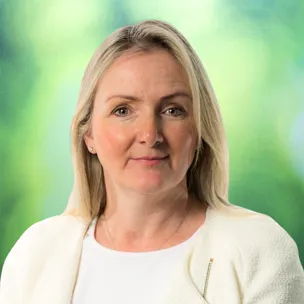
Lorraine Harvey
Partner, Family Law
Call our specialist Surrogacy Law Solicitors and we will help you.


If you have decided to use surrogacy to build your family, it is important to understand what the rights and responsibilities will be for you and for your surrogate during the process, to minimise the chances of any problems occurring. Whether your surrogacy arrangement takes place entirely in the UK, or is an international arrangement, getting legal advice from a specialist Surrogacy Solicitor is a vital part of the process.
Our specialist Family and Fertility Law Team have many years’ of experience in dealing with surrogacy. They have helped many surrogates and intended parents complete the legal aspects of surrogacy, and have helped families faced with legal difficulties where things have not gone to plan. We can help you to understand the process and make sure you all get the outcome you’re expecting at the end.
Get in touch with our Family Law Solicitors for specialist surrogacy legal advice tailored to you and your family.



We are highly experienced in advising intended parents who want to grow their families through surrogacy and surrogates.
We're available to give you professional legal advice on your legal rights and responsibilities as an Intended Parent, parents or as a Surrogate
We'll help you in applying for a Parental Order, either after a domestic surrogacy arrangement, or one that has taken place abroad
Our experienced team will support you through the process, including if you have to go to court or if any disputes arise.
We also work closely with other specialists who can help you address immigration issues where you have international links
Simpson Millar5 stars
Highly professional & Proactive
Sarah has been amazing throughout my court case. She is very professional and proactive in her role. She keeps me updated with regards to my case and is always at hand for assistance when needed. Coul...
Leanne houghton
Simpson Millar5 stars
I found Simpson Millar to be a very trustworthy, reliable and approachable
I found Simpson Millar to be a very contentious and diligent company to have representing me. It was a very complex and litigious case with lots of attempts from the other side to stall and derail th...
Customer
Simpson Millar5 stars
Solicitor Chris Fairhurst
I have been a client of Simpson Millar for nearly 4 years. I contacted Simpson Millar for help and support with a child arrangements order. I spoke to Chris Fairhurst who listened to all my background...
Taylor Woods
Simpson Millar5 stars
I would like to acknowledge the advise
I would like to acknowledge the advise, guidance and spectacular work Ren has done for me, as my solicitor. My matter is extremely complex and difficult with the other side not communicating or co-o...
Noreen
Simpson Millar5 stars
Such an amazing result!
I'd taken Simpson Millar on after advice from my police federation regarding child arrangements and family court matter. Straightforward, honest and approachable, both of the solicitors I had were i...
Matthew Mitchell
Simpson Millar4 stars
It listens to complaints and always…
It listens to complaints and always finds solution
Eronmonmene Festus Ubuane
Simpson Millar5 stars
Lorraine led me through the divorce…
Lorraine led me through the divorce process by the hand and I have no doubt that whole process would have been far more traumatic had it not been for the expertise and compassion of her and her team....
Clare Hodges
A surrogacy agreement sets out the arrangements of your surrogacy. There’s no legal requirement to have a surrogacy agreement in England or Wales, but they are always recommended and in some countries they are compulsory.
In some countries, your surrogacy agreement will create a legally binding agreement between the Intended Parent or parents and Surrogate. In England and Wales, a surrogacy agreement is not legally binding, and it does not determine who will be or can be the legal parent or parents of the child, but it is still an important document.
If disagreements happen further down the line, the surrogacy agreement is evidence of your original intentions, and can help the court understand what had been planned, what has changed and why. It also helps to prove that everyone involved fully understood their role in the arrangement, and gave their full consent.
The process of drafting a surrogacy agreement also helps to make sure the Intended Parent or parents and Surrogate are on the same page, and that you all have the same expectations about how it will all work. This can help avoid disagreements further down the line.
As the law stands, Lawyers and Solicitors cannot negotiate or draft surrogacy agreements, but they can help you understand the important aspects of surrogacy arrangements and the things you will need to consider. A surrogacy agreement should be prepared before conception takes place.
Having a surrogacy agreement:
There are two types of surrogacy:
Host / Gestational Surrogacy – this is where the surrogate is not biologically related to the baby, so either the Intended Mother or donor eggs are used.
Straight / Traditional Surrogacy – this is where the surrogate is biologically related to the baby.
English Law applies the same, whichever type of surrogacy is used. Regardless of biological connection, the surrogate will always be the legal mother when the child is born, and until legal parenthood is transferred by a Parental Order.
Who is the child’s second legal parent depends on a number of factors, including whether the surrogate is married or in a civil partnership, and the biological link to the Intended Father.
It is important to understand that even if your surrogacy arrangement has taken place abroad, English law on legal parenthood will still apply when you return home to the UK. That means you still need to apply for a parental order, even if you are already classed as legal parents in the country your baby was born, or if you are already named on a foreign birth certificate.
Parental Responsibility is the right to make key decisions about a child’s welfare and upbringing, and the right to information about the child. Often, Intended Parents will not have Parental Responsibility when the baby is first born.
In many cases, this is resolved by consent forms and co-operation with your surrogate. In some cases, it becomes important for Intended Parents to obtain Parental Responsibility before the main Parental Order is made.
Our specialist Family Lawyers can help you make the right application to fit the circumstances, when the need arises.
Whether your baby has been born in England or Wales, or abroad, you will need to transfer legal parenthood in this country after the baby is born.
In some countries, legal parenthood is already given to an intended parent before birth, but you will still need to obtain legal parenthood when you get back home to the UK.
In England and Wales, as the law stands, it is not possible to re-assign legal parenthood until after the baby is born.
This is done by a special order, called a Parental Order.
A Parental Order has the effect of bringing to an end the legal parenthood and parental responsibility of the surrogate (and if applicable, her spouse or civil partner), and granting legal parenthood and parental responsibility on the intended parent or parents.
There are a set list of criteria that anyone wanting to obtain a Parental Order must meet. It is a requirement that all the criteria are met, so it's vital to get legal advice tailored to your specific circumstances before you embark on a surrogacy arrangement, so you can make sure you won't meet any unexpected obstacles that could stop a Parental Order being made.
The criteria any intended parent or parents must meet are known as the “s54 Criteria or Checklist”. They are:
The Court will then consider all the circumstances of the case, and whether it is in the child’s best interests for the order to be made.
The presumption is always that it will be very unusual circumstances only where the Court will consider it would not be appropriate to make the Parental Order, if the s54 criteria are met.
Intended Parents always have to attend Court hearings relating to their Parental Order application. Sometimes, the Court likes your baby to present when the Parental Order is made.
If your surrogate consents to the Parental Order, then usually, she won't need to attend court (though she is allowed to if she wants to) and her role is usually limited to completing some forms.
Going to Court does seem daunting, but Parental Order cases are usually straightforward and there will be no complex legal or evidential arguments. We can help you through the whole process – having a specialist surrogacy lawyer can help you to feel more in control of the situation and frees up your time to attend to the demands of your new baby.
How long it takes to get a Parental Order varies. It depends on:
Domestic surrogacy arrangements (those taking place in England and Wales only) are dealt with by Magistrates or District Judges, and tend to progress more quickly.
All international surrogacy arrangements, or cases where there are complexities, are dealt with in the High Court and take on average 6 to 12 months.
If problems arise that mean you cannot get a Parental Order, there are other options that can resolve who cares for the baby, and who has decision-making powers. Which orders are the right ones, depends on the circumstances on the case. Other options include:
Problems are rare, but they do happen. Our specialist team have been involved in a number of key Court cases that have looked at how to resolve problems that have arisen when a surrogacy arrangement or Parental Order application has gone wrong.
They are proud to have helped push the boundaries of the interpretation of the s54 criteria to help clients gain legal parenthood.
A Parental Order can only be granted by the court. The process is usually straightforward.
They key steps in the process are:
Complete a Parental Order application form and send it to Court. You’ll give details about you and your surrogate.
Your surrogate will complete a consent form and you’ll need to prepare a witness statement to show the Court that you meet the criteria for a parental order. You’ll need to include information about your family background and details of your surrogacy arrangement.
A CAFCASS Officer will prepare a report that will assess whether a Parental Order is in the best interests of the child. They will speak to you and sometimes to your surrogate, and meet your child, before sending their final report to Court.
Not all parental order applications have more than one hearing, and it will depend on the circumstances of the cases, and what issues there are for the court to look at. In some cases, a court will have a first hearing to assess what the issues are, and to set a timetable for the information needed to address the issues. Some straightforward cases do not have this administrative step, and progress straight to a final hearing. Where cases are more complicated, sometimes multiple hearings will be needed.
The Court will either decide to make the Parental Order and if so, the order is granted on that date.
If your surrogacy arrangement crosses international borders, it can be more complicated legally, and it is crucial to get legal advice in both countries. You will also often need to get immigration advice, to make sure you can bring your baby back to the UK without problems.
Different countries have different laws on surrogacy and legal parenthood. It is important to make sure the arrangement you propose meets the necessary criteria in both countries.
You must get specialist legal advice in the country your surrogate lives and where you live - you should do this before starting the surrogacy process. Getting the right legal advice now will make sure that your child has a smooth transition into your family life in the UK.
Even if you are classed as a legal parent from the outset in the country in which your surrogate lives, or your baby is born, you will still need to obtain a Parental Order in order to be classed as a parent in England and Wales. This is the case even if you are named on the birth certificate in the country of birth.
The law regarding what payments you can make to your surrogate and others involved in the process (such as agencies) differs significantly worldwide.
It is important to make sure any payments you make comply with local law, as it can often be a criminal offence if not.
Although it is illegal to pay commercial payments in the UK, the Court can (and will) sanction commercial payments made abroad if they are in keeping with local law and an appropriate amount in that jurisdiction; it is not illegal to have a commercial surrogacy arrangement abroad where it is permitted and then come back home to the UK.
You will need to make sure you have the right travel documents and permissions in place before you travel, and this often requires careful planning in advance. Immigration Lawyers can be a vital part of your team to make sure your surrogacy journey goes smoothly.
An application for a Parental Order is the same whether your baby has been born in England, Wales or abroad, but if you had an international surrogacy arrangement, or you have close links with another country (such as you were born abroad or have foreign citizenship) your case will usually be heard in the High Court. This is nothing to worry about, and ensures your application is heard by a specialist Judge.
Planning which country you will go to for your surrogacy is an important part of the process. Some countries do not allow surrogacy at all, others allow surrogacy, but have no legal mechanism to transfer parenthood.
Some countries only allow surrogacy in limited circumstances, for example to heterosexual couples, or where there is a medical need. Other surrogacy destinations are far more inclusive and accessible.
It is important to find the one that is right for you.
Our Fertility and Surrogacy Solicitors can help you make sure you can obtain legal parenthood on your return and work closely with your foreign solicitor to make sure all the documents are signed and translated.
Fill in the form below to get in touch with one of our dedicated team members, or call our team today on: 0808 239 3465